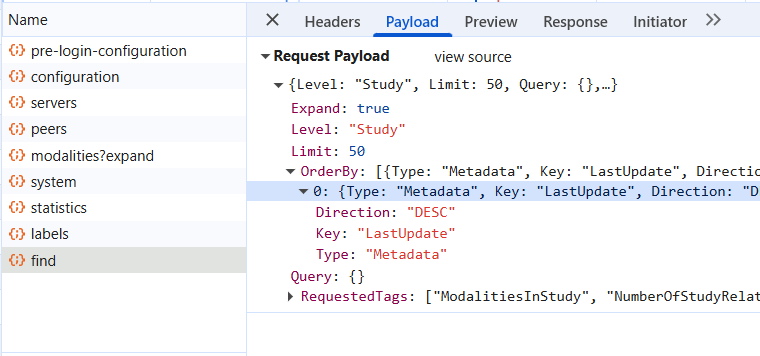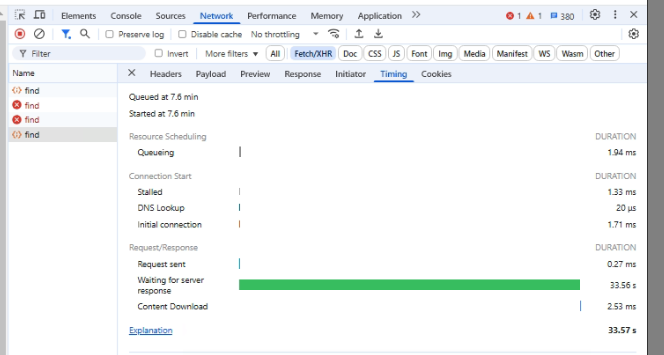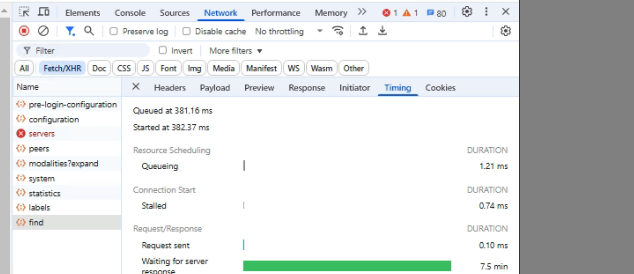Hi All and @alainmazy ,
Do you guys have experienced that Orthanc OE2 return query very slow ? With this simple search by date rage, it took more than 30 seconds (sometimes it took several minutes) to display the result ?
This is statistics of my Orthanc
{
"CountInstances" : 8046517,
"CountPatients" : 29856,
"CountSeries" : 168839,
"CountStudies" : 53422,
"TotalDiskSize" : "6443366622921",
"TotalDiskSizeMB" : 6144873,
"TotalUncompressedSize" : "6443366622921",
"TotalUncompressedSizeMB" : 6144873
}
I do not think it’s too much instances. In the verbose log , it just only see
I0509 15:50:02.130019 HTTP-27 HttpServer.cpp:1263] (http) POST /tools/find
I am using the Orthanc Team Docker version : orthancteam/orthanc:25.4.0-full
I already follow the optimization guide for Postgres in Scalability of Orthanc — Orthanc Book documentation , but the query is still slow
This is my orthanc configuration
{
"Name": "MyOrthanc",
"StorageDirectory": "/var/lib/orthanc/db",
"DelayedDeletion": {
"Enable": true,
"ThrottleDelayMs": 0,
"Path": "/var/lib/orthanc/db/delayed-deletion-1.db"
},
"IndexDirectory": "/var/lib/orthanc/db",
"StorageCompression": false,
"MaximumStorageSize": 0,
"MaximumPatientCount": 0,
"MaximumStorageMode": "Recycle",
"MaximumStorageCacheSize": 128,
"LuaScripts": [
"/lua-scripts/MyScript.lua"
],
"LuaHeartBeatPeriod": 0,
"PostgreSQL": {
"EnableIndex": true,
"EnableStorage": false,
"Lock": false,
"Host": "orthanc-ct-mr-2025-db",
"Port": 5432,
"Database": "orthanc",
"Username": "postgres",
"Password": "orthanc",
"EnableSsl": false,
"MaximumConnectionRetries": 10,
"ConnectionRetryInterval": 10,
"IndexConnectionsCount": 20,
"EnableVerboseLogs": false,
"TransactionMode": "ReadCommitted"
},
"Java": {
"Enabled": true,
"Classpath": "/java/OrthancJavaSDK.jar:/java/target/OrthancJavaPlugin-1.0.1-jar-with-dependencies.jar",
"InitializationClass": "Main",
"Enable": true
},
"DicomWeb": {
"Enable": true,
"Root": "/wado-rs/",
"EnableWado": true,
"WadoRoot": "/wado",
"Ssl": false,
"QidoCaseSensitive": true,
"Host": "",
"StudiesMetadata": "Full",
"SeriesMetadata": "Full",
"EnableMetadataCache": true,
"MetadataWorkerThreadsCount": 4,
"PublicRoot": "/dicom-web/"
},
"Transfers": {
"Threads": 6,
"BucketSize": 4096,
"CacheSize": 512,
"MaxPushTransactions": 20,
"MaxHttpRetries": 10,
"PeerConnectivityTimeout": 120
},
"OrthancExplorer2": {
"Enable": true,
"IsDefaultOrthancUI": true,
"UiOptions": {
"ViewersOrdering": [
"ohif",
"wsi"
],
"OhifViewer3PublicRoot": "/saola/"
}
},
"OHIF": {
"DataSource": "wado-rs"
},
"OrthancPeers": {
"peer": {
"Url": "http://27.72.147.196:8042/",
"Username": "orthanc",
"Password": "orthanc",
"Timeout": 1
}
},
"ConcurrentJobs": 10,
"JobsEngineThreadsCount": {
"ResourceModification": 1
},
"HttpServerEnabled": true,
"OrthancExplorerEnabled": true,
"HttpPort": 8042,
"HttpDescribeErrors": true,
"HttpCompressionEnabled": false,
"WebDavEnabled": true,
"WebDavDeleteAllowed": false,
"WebDavUploadAllowed": true,
"DicomServerEnabled": true,
"DicomAet": "ORTHANC",
"DicomCheckCalledAet": false,
"DicomPort": 4242,
"DefaultEncoding": "Latin1",
"AcceptedTransferSyntaxes": [
"1.2.840.10008.1.*"
],
"UnknownSopClassAccepted": false,
"DicomScpTimeout": 30,
"RemoteAccessAllowed": true,
"SslEnabled": false,
"SslCertificate": "certificate.pem",
"SslMinimumProtocolVersion": 4,
"SslVerifyPeers": false,
"SslTrustedClientCertificates": "trustedClientCertificates.pem",
"AuthenticationEnabled": true,
"RegisteredUsers": {
"orthanc": "orthanc"
},
"DicomTlsEnabled": false,
"DicomTlsRemoteCertificateRequired": true,
"DicomTlsMinimumProtocolVersion": 0,
"DicomAlwaysAllowEcho": true,
"DicomAlwaysAllowStore": true,
"DicomAlwaysAllowFind": false,
"DicomAlwaysAllowFindWorklist": false,
"DicomAlwaysAllowGet": false,
"DicomAlwaysAllowMove": false,
"DicomCheckModalityHost": false,
"DicomModalities": {
"SELF": [
"SELF",
"localhost",
4242
]
},
"DicomModalitiesInDatabase": false,
"DicomEchoChecksFind": false,
"DicomScuTimeout": 10,
"DicomScuPreferredTransferSyntax": "1.2.840.10008.1.2.1",
"DicomThreadsCount": 4,
"OrthancPeersInDatabase": false,
"HttpProxy": "",
"HttpVerbose": false,
"HttpTimeout": 60,
"HttpsVerifyPeers": true,
"HttpsCACertificates": "",
"UserMetadata": {},
"UserContentType": {},
"StableAge": 2,
"StrictAetComparison": false,
"StoreMD5ForAttachments": true,
"LimitFindResults": 100,
"LimitFindInstances": 100,
"LogExportedResources": false,
"KeepAlive": true,
"KeepAliveTimeout": 1,
"TcpNoDelay": true,
"HttpThreadsCount": 100,
"StoreDicom": true,
"DicomAssociationCloseDelay": 5,
"QueryRetrieveSize": 100,
"CaseSensitivePN": false,
"LoadPrivateDictionary": true,
"Dictionary": {},
"SynchronousCMove": true,
"JobsHistorySize": 1000,
"SaveJobs": true,
"OverwriteInstances": true,
"MediaArchiveSize": 1,
"StorageAccessOnFind": "Never",
"MetricsEnabled": true,
"ExecuteLuaEnabled": false,
"RestApiWriteToFileSystemEnabled": false,
"HttpRequestTimeout": 30,
"DefaultPrivateCreator": "",
"StorageCommitmentReportsSize": 100,
"TranscodeDicomProtocol": true,
"BuiltinDecoderTranscoderOrder": "After",
"IngestTranscodingOfUncompressed": true,
"IngestTranscodingOfCompressed": true,
"DicomLossyTranscodingQuality": 90,
"SyncStorageArea": true,
"MallocArenaMax": 5,
"DeidentifyLogs": true,
"DeidentifyLogsDicomVersion": "2023b",
"MaximumPduLength": 16384,
"DatabaseServerIdentifier": "Orthanc1",
"CheckRevisions": false,
"SynchronousZipStream": true,
"ZipLoaderThreads": 0,
"Warnings": {
"W001_TagsBeingReadFromStorage": true,
"W002_InconsistentDicomTagsInDb": true
},
"Plugins": [
"/run/orthanc/plugins",
"/usr/share/orthanc/plugins"
],
"Gdcm": {
"Throttling": 4,
"RestrictTransferSyntaxes": [
"1.2.840.10008.1.2.4.90",
"1.2.840.10008.1.2.4.91",
"1.2.840.10008.1.2.4.92",
"1.2.840.10008.1.2.4.93"
]
}
}



